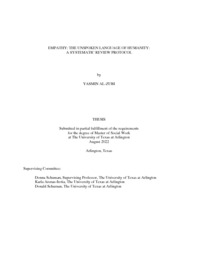
ATTENTION: The works hosted here are being migrated to a new repository that will consolidate resources, improve discoverability, and better show UTA's research impact on the global community. We will update authors as the migration progresses. Please see MavMatrix for more information.
Show simple item record
| dc.contributor.advisor | Schuman, Donna | |
| dc.creator | Al-Zubi, Yasmin Khaled | |
| dc.date.accessioned | 2022-09-15T11:48:31Z | |
| dc.date.available | 2022-09-15T11:48:31Z | |
| dc.date.created | 2022-08 | |
| dc.date.issued | 2022-08-15 | |
| dc.date.submitted | August 2022 | |
| dc.identifier.uri | http://hdl.handle.net/10106/30927 | |
| dc.description.abstract | Prolonged exposure to violence may result in habituation or desensitization, which has negative impacts. Desensitization to real-life violence is a reduced initial arousal response to real-life violence. Real-life violence includes physical abuse, sexual abuse, domestic violence, intimate partner violence, peer violence, and community violence. Children who have been exposed to violence-related adverse childhood experiences (ACEs) are more likely to achieve violence desensitization, by definition. As a result of ACEs, children are at risk of mental health complications, health-related problems, and risk for maladaptive behavior. Children who have reached violence desensitization are more likely to exhibit externalized symptoms such as aggression and criminal actions. In efforts to reverse the effects of real-life violence desensitization, this study proposes a systematic review to answer the following question: Is there any evidence of the effects of psychoeducation on empathy to reverse the impacts of real-life violence desensitization in children, aged 18 or younger, who are exhibiting aggressive behavior? To answer the research question, this systematic review will follow PRISMA and JBI guidelines to ensure research rigor in screening relevant studies and extracting pertinent data before analysis. A comprehensive electronic search will be performed to identify eligible studies completed since 1995, and indexed in APA PsychINFO, CINAHL Complete, Psychology and Behavioral Sciences Collection, and Social Work Abstracts. The participants, intervention, comparison, outcomes inclusion criteria will be used to define inclusion and exclusion criteria in a known strategy for framing a clinically focused research question. Findings will be narratively synthesized and will not consist of any other analyses. This is the first known systematic review that examines the existence of the effects of empathy psychoeducation to reverse real-life violence desensitization effects. Results of the review are anticipated to inform mental health and healthcare practices to minimize externalized symptoms of violent-related ACEs and violence desensitization. | |
| dc.format.mimetype | application/pdf | |
| dc.language.iso | en_US | |
| dc.subject | Social learning | |
| dc.subject | Child health | |
| dc.subject | Social neuroscience | |
| dc.subject | Traumatic experience | |
| dc.subject | Violence desensitization | |
| dc.subject | Mental health | |
| dc.title | Empathy: The Unspoken Language of Humanity: A Systematic Review Protocol | |
| dc.type | Thesis | |
| dc.contributor.committeeMember | AlZubi, Yasmin K | |
| dc.degree.department | Social Work | |
| dc.degree.name | Master of Social Work | |
| dc.date.updated | 2022-09-15T11:48:32Z | |
| thesis.degree.department | Social Work | |
| thesis.degree.grantor | The University of Texas at Arlington | |
| thesis.degree.level | Masters | |
| thesis.degree.name | Master of Social Work | |
| dc.type.material | text | |
| dc.creator.orcid | 0000-0001-8085-8426 | |
Files in this item
- Name:
- AL-ZUBI-THESIS-2022.pdf
- Size:
- 573.3Kb
- Format:
- PDF
This item appears in the following Collection(s)
Show simple item record


